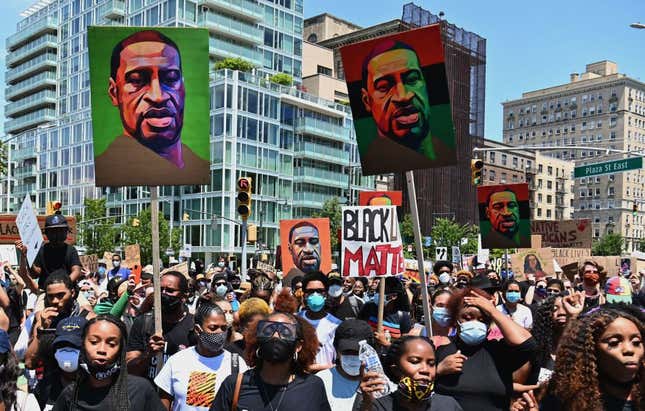
Last year during the protests for racial justice, almost every major corporation released a statement standing in solidarity with the Black community. From McDonald’s to Nike, companies used their platform to shed light on the ongoing state-sanctioned violence against Black people, pledged to support Black communities, and as of June 2020, donated a total of nearly $1.7 billion to “eradicate racism.” However, these messages of solidarity championing equity and decrying racism mean nothing unless these corporate giants interrogate how injustice plays out in their internal structures and continuously harms Black people.
Nearly every industry’s statements in support of racial justice directly contradicts the role they’ve played in upholding systemic racism. Wall Street should not be comfortable writing a check to racial justice organizations without taking accountability for centuries of racist banking policies that have built systems of economic injustice. If Big Oil corporations claim to live their values of diversity and inclusion, they must acknowledge accountability for their role in the decades-long damages of environmental racism. After dedications to support Black workers and even adopting Black aesthetics for their own profit, the bare minimum Nike can do is provide their Black workers with an actual living wage. Retail companies cannot simultaneously support the fight against injustice while prioritizing their profits over their workers, These empty promises are a public relations stunt, and we refuse to stand by while these companies make a profit off of performative activism.
The bottom line: Racial justice means more than words and throwing money at the problem—it requires taking meaningful action and going beyond the statement to back up their support for Black people by addressing systemic racism within their own business structures.
One of the biggest offenders in hypocritical racial justice practices is the tech industry. During the largest uprising in United States’ history last summer, the public took to digital platforms like Facebook and Twitter to learn about and spread information regarding protests, donations, and petitions to support the racial justice movement. Effectively, social media platforms became vehicles to strategize actions and to mobilize people on the ground. Despite their messages of solidarity, Big Tech companies continued practices of fueling white supremacist violence and demonstrated an unwillingness to implement measures to protect Black workers, directly undermining their statements of solidarity to racial justice efforts. Their business models continue to value profits and power over people through policy and product decisions that compromise the safety of Black users and employees.
Google and Facebook made multimillion dollar pledges to support Black creators, but still allow white nationalism to spread on their platforms, directly putting Black people in jeopardy. Last month, Google was exposed for blocking advertisers from targeting videos with terms like “Black lives matter” and “Black power.” There was no problem, however, with terms like “White power” or “White lives matter.” These blatant racial injustices would suggest that any corporation, especially ones so dedicated to racial equity, would be open to investigate and repair any gaps in their infrastructure that allow for these detrimental “slip-ups” to continue. We’ve already demanded a public and independent racial equity audit to assess Google’s products, policies, and practices—and they’re not the only ones who need one.
Banks like JP Morgan, Bank of America, and Citigroup are encouraging shareholders to vote against proposals to conduct racial equity audits of their internal practices. Johnson & Johnson and Amazon are desperately trying to suppress shareholder-led, internal calls for racial equity audits. The widespread hesitancy and refusal to conduct internal investigations shows corporations cannot be trusted to self-regulate. We have the power to demand public accountability and to verify that these corporate structures are reviewed to be in alignment with their commitment to racial justice.
This past year has brought about great strides in bringing racial justice to the forefront of mainstream conversations. Police accountability and protecting Black communities have finally become widespread ideas, but our fight is far from over. Until racial justice is a priority for America, policymakers and the corporations who profit off of our labor, we will not rest in working to bring about an equitable nation for our communities and the generations to come.
Arisha Hatch is vice president of campaigns, Color Of Change, the largest online racial justice organization in the country. Color Of Change helps people respond effectively to injustice in the world around us. As a national online force driven by over 7 million members, we move decision-makers in corporations and government to create a more human and less hostile world for Black people in America. Visit www.colorofchange.org.

